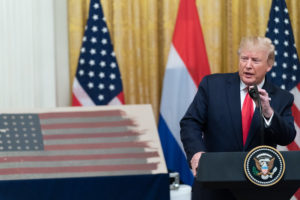
President Donald J. Trump, joined by the Prime Minister of the Netherlands Mark Rutte, participates Thursday, July 18, 2019, in the presentation of a WW II flag flown aboard a landing craft during the D-Day invasion at Normandy in 1944, presented to officials of the Smithsonian Institute during a ceremony in the East Room of the White House. (Official White House Photo by Shealah Craighead)
At The American Conservative, the magazine’s editor Jim Antle, describes the differing views among conservatives at a recent national conservatism conference. He pays special attention to the history and views of National Security Advisor John Bolton. Bolton is not a perfect neocon, but as Antle writes, “It is difficult to see what would have been different if Bolton’s role would have been filled with a neocon.” Antle goes on to warn against using the wave of “nationalism,” as an “excuse to repeat past conservative mistakes on war and peace.” He is correct, it would be a shame to waste the enthusiasm of voters on the right with a foreign war that would only further sap American resolve. Antle writes (abridged):
Asked to weigh in on co-keynoting a conference with national security adviser John Bolton, Tucker Carlson demurred, saying different perspectives should be heard.
Many of the main voices at the inaugural National Conservatism Conference reject a foreign policy of forever war. This includes not just Carlson but fellow keynoter Peter Thiel (“On this most important issue Donald Trump is right,” Thiel said at the 2016 Republican convention. “It’s time to end the era of stupid wars and rebuild our country.”), organizer Yoram Hazony, who was sharply critical of neoconservatives in his own speech, and best-selling author J.D. Vance.
But a nontrivial number of speakers who were on the schedule purely for their foreign policy expertise would have been comfortable during the administration of George W. Bush, who was no nationalist conservative. Bolton, who at one point stressed the common ground between President Trump and John McCain, illustrated how to package the old foreign policy to appeal to those interested in a new conservatism.
That is, speak in concrete terms about American interests and security rather than abstract appeals to American values; invoke Samuel Huntington, whose “Clash of Civilizations” is a major influence among nationalist conservatives; play up nationalist concerns about China; don’t talk about democracy promotion or nation-building; quote Edmund Burke liberally.
Bolton has always rejected the neocon label.. And it is true that he is a skeptic of democracy promotion and some of the other more idealistic components of the Bush doctrine.
At the same time, Bolton has supported most preventive wars the United States has waged since 9/11 and continuing the Afghanistan war long after it has achieved any obvious results. He seeks a new Cold War, replacing the Soviet Union with China, Iran, Iraq or some other country that can be said to be the main hotbed of radical Islam, regardless of which strain. It is difficult to see what would have been different if Bolton’s role would have been filled with a neocon.
Consider that Tom Cotton and Nikki Haley are among the would-be successors to Trump. Cotton is at least aligned with Trump on immigration. It is not clear that Haley, like Bolton, even goes that far. If nationalists are going to criticize libertarians alongside neoconservatives, they must lay out their own vision of prudence and restraint.
There is much that is promising about the nationalist project. It would be a shame if it was used an excuse to repeat past conservative mistakes on war and peace.
Read more here.
If you’re willing to fight for Main Street America, click here to sign up for my free weekly email.





